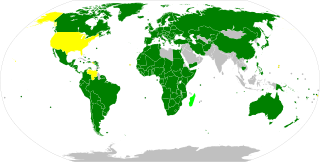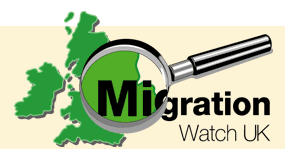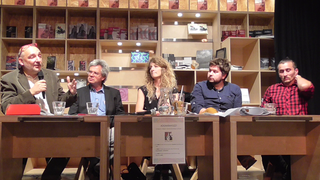The Office of the United Nations High Commissioner for Refugees (UNHCR) is a United Nations agency mandated to aid and protect refugees, forcibly displaced communities, and stateless people, and to assist in their voluntary repatriation, local integration or resettlement to a third country. It is headquartered in Geneva, Switzerland, with over 18,879 staff working in 138 countries as of 2020.

The Home Office (HO), also known as the Home Department, is a ministerial department of the Government of the United Kingdom. It is responsible for immigration, security, and law and order. As such, it is responsible for policing in England and Wales, fire and rescue services in England, Border Force, visas and immigration, and the Security Service (MI5). It is also in charge of government policy on security-related issues such as drugs, counterterrorism, and immigration. It was formerly responsible for His Majesty's Prison Service and the National Probation Service, but these have been transferred to the Ministry of Justice.

Claude Ajit Moraes is a British Labour Party politician and campaigner, who was a Member of the European Parliament (MEP) for London between 1999 and the United Kingdom's withdrawal from the EU on 31 January 2020. He was chair of the Civil Liberties, Justice and Home Affairs Committee, Deputy Leader of the European Parliamentary Labour Party and vice-president of the Socialists and Democrats Group in the European Parliament.
In international law, a stateless person is someone who is "not considered as a national by any state under the operation of its law". Some stateless people are also refugees. However, not all refugees are stateless, and many people who are stateless have never crossed an international border. At the end of 2022, the United Nations High Commissioner for Refugees estimated 4.4 million people worldwide as either stateless or of undetermined nationality, 90,800 (+2%) more than at the end of 2021.
Since 1945, immigration to the United Kingdom, controlled by British immigration law and to an extent by British nationality law, has been significant, in particular from the Republic of Ireland and from the former British Empire, especially India, Bangladesh, Pakistan, the Caribbean, South Africa, Nigeria, Ghana, Kenya, and Hong Kong. Since the accession of the UK to the European Communities in the 1970s and the creation of the EU in the early 1990s, immigrants relocated from member states of the European Union, exercising one of the European Union's Four Freedoms. In 2021, since Brexit came into effect, previous EU citizenship's right to newly move to and reside in the UK on a permanent basis does not apply anymore. A smaller number have come as asylum seekers seeking protection as refugees under the United Nations 1951 Refugee Convention.

The Dublin Regulation is a Regulation of the European Union that determines which EU member state is responsible for the examination of an application for asylum, submitted by persons seeking international protection under the Geneva Convention and the Qualification Directive, within the European Union.

The Convention Relating to the Status of Refugees, also known as the 1951 Refugee Convention or the Geneva Convention of 28 July 1951 is a United Nations multilateral treaty that defines who a refugee is and sets out the rights of individuals who are granted asylum and the responsibilities of nations that grant asylum. The convention also sets out which people do not qualify as refugees, such as war criminals. The convention also provides for some visa-free travel for holders of refugee travel documents issued under the convention.

Migration Watch UK is a British think-tank and campaign group which argues for lower immigration into the United Kingdom. Founded in 2001, the group believes that international migration places undue demand on limited resources and that the current level of immigration is not sustainable.
Human rights in Kuwait are a topic of significant concern. Most notably, Kuwait's handling of the stateless Bedoon crisis has come under substantial criticism from international human rights organisations and the United Nations. Kuwait has the largest number of stateless people in the entire region. Kuwait also faces significant criticism for the human rights violations against foreign nationals, women, and LGBT people. Although Kuwaiti law theoretically pledges to protect all human rights; the enforcement mechanisms designed to help protect human rights are very limited in Kuwait.

The Hungarian Helsinki Committee is a non-governmental human rights organization founded in 1989 and based in Budapest, Hungary. The HHC is a member of the International Helsinki Federation for Human Rights and the European Council on Refugees and Exiles. The HHC defines itself as monitoring the respect for human rights protected by international human rights instruments, to inform the public about human rights violations and to provide victims of human rights abuse with free legal assistance. It is also linked with the OMCT and is a member organisation of the European Council on Refugees and Exiles (ECRE).
Asylum shopping is a term for the practice by some asylum seekers of applying for asylum in several states or seeking to apply in a particular state after traveling through other states. It is used mostly in the context of the European Union and the Schengen Area, but has also been used by the Federal Court of Canada.
The Gateway Protection Programme was a refugee resettlement scheme operated by the Government of the United Kingdom in partnership with the United Nations High Commissioner for Refugees (UNHCR) and co-funded by the European Union (EU), offering a legal route for a quota of UNHCR-identified refugees to be resettled in the UK. Following a proposal by the British Home Secretary, David Blunkett, in October 2001, the legal basis was established by the Nationality, Immigration and Asylum Act 2002 and the programme itself launched in March 2004. The programme enjoyed broad support from the UK's main political parties.
The Bedoon or Bidoon, fully Bidoon jinsiya, are stateless people in several Middle Eastern countries, but particularly in Kuwait, where there is a large population of stateless people who lack access to many of the country's basic services. It is widely believed that the Bedoon issue in Kuwait is sectarian in nature.
Asylum in Australia has been granted to many refugees since 1945, when half a million Europeans displaced by World War II were given asylum. Since then, there have been periodic waves of asylum seekers from South East Asia and the Middle East, with government policy and public opinion changing over the years.

During 2015, there was a period of significantly increased movement of refugees and migrants into Europe. 1.3 million people came to the continent to request asylum, the most in a single year since World War II. They were mostly Syrians, but also included significant numbers from Afghanistan, Nigeria, Pakistan, Iraq, Eritrea, and the Balkans. The increase in asylum seekers has been attributed to factors such as the escalation of various wars in the Middle East and ISIL's territorial and military dominance in the region due to the Arab Winter, as well as Lebanon, Jordan, and Egypt ceasing to accept Syrian asylum seekers.
The Independent Asylum Commission (IAC) was an organisation which attempted to "conduct a truly independent review of the UK asylum system from beginning to end." The commission was made up of groups of citizens from local churches, mosques, trade union branches, schools, and other various community groups from the London Citizens and Birmingham Citizens. The Commission was independent of the UK government and the refugee sector, and was funded entirely by charitable trusts. It sought to examine key stages of the asylum process such as the access to the asylum through its determination process, the appeals process, treatment of vulnerable groups, and material support and accommodation. The commission held public hearings throughout the UK between January and November 2007. It published its initial findings in March 2008 and then three full reports over summer 2008. The initial report said that the UK's treatment of asylum seekers falls "seriously below" the standards of a civilised society. The Border and Immigration Agency rejected the report, claiming it operates a "firm but humane" system.
The UK Home Office hostile environment policy is a set of administrative and legislative measures designed to make staying in the United Kingdom as difficult as possible for people without leave to remain, in the hope that they may "voluntarily leave". The Home Office policy was first announced in 2012 under the Conservative–Liberal Democrat coalition. The policy was widely seen as being part of a strategy of reducing UK immigration figures to the levels promised in the 2010 Conservative Party Election Manifesto.
An increasing number of refugees and migrants have been entering the United Kingdom illegally by crossing the English Channel in the last decades. The Strait of Dover section between Dover in England and Calais in France represents the shortest sea crossing, and is a long-established shipping route. The shortest distance across the strait, at approximately 20 miles, is from the South Foreland, northeast of Dover in the English county of Kent, to Cap Gris Nez, a cape near to Calais in the French département of Pas-de-Calais.
The migration and asylum policy of the European Union is within the area of freedom, security and justice, established to develop and harmonise principles and measures used by member countries of the European Union to regulate migration processes and to manage issues concerning asylum and refugee status in the European Union.
Emma L. Briant is a British scholar and academic researcher on media, contemporary propaganda, surveillance and information warfare who was involved in exposing the Facebook–Cambridge Analytica data scandal concerning data misuse and disinformation. She became Associate Professor of News and Political Communication at Monash University in Melbourne, Australia in 2023. Before this she was an associate researcher at Bard College and taught in the School of Communication at American University. Briant became an honorary associate in Cambridge University Center for Financial Reporting & Accountability, headed by Alan Jagolinzer, and joined Central European University, as a Fellow in the Center for Media, Data and Society in 2022.







